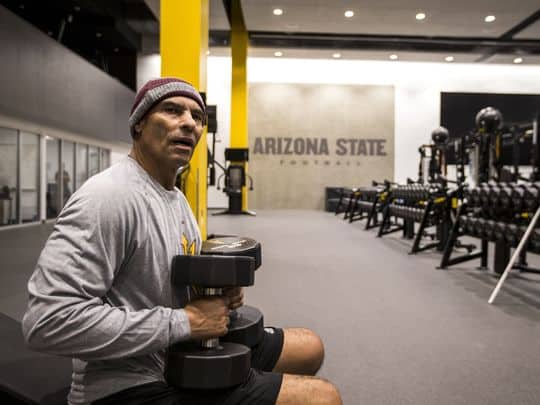On Sunday, NFL offensive line coach Tony Sparano died at the young age of 56 just days before his Vikings were set to start training camp in preparation for the upcoming season. Sparano complained of chest pains and went to the hospital on Thursday but was released on Friday. The cause of death was determined to be arteriosclerotic heart disease. His untimely death was a shock to many fans as 56 is certainly not considered old in this day and age.
Despite an average head coaching career, Sparano is still beloved by Dolphins fans for delivering a division title in 2008 when he was head coach of the team. This is the only time in the past 15 years that the mighty New England Patriots did not win the AFC East crown. 2008 was the year Sparano brought back the “wildcat” formation which sent defensive coordinators searching for answers and endlessly shuffling play sheets on the sidelines.
Sparano was interim head coach for the Oakland Raiders during the 2014 season but was not retained thereafter. His next gigs were as a position coach for the 49ers and Vikings, thus he was no longer in the limelight. When his name resurfaced due to his untimely death, it was hard not to notice his physical health had deteriorated, particularly his weight. While he was never a thin man, it’s clear that he had put on a considerable amount of weight since his time in Miami.
Being head coach in the NFL is easily one of the most stressful jobs you could have. The job turnover rate alone is enough to keep you up at night in November with your team sporting a 3-8 record. At the conclusion of the 2017 NFL season, 7 coaches were fired. The previous season, 5 coaches were fired. Remember, there are only 32 teams and thus 32 head coaching jobs. As a result, this equates to a massive 20% turnover rate every year. In addition, you may have heard the term hot seat thrown around when it comes to coaches. Hot seat basically means that a coach’s job is on thin ice. When you combine coaches who are fired with coaches on the hot seat, you have basically half the league in that category. This constant coaching limbo is the norm in professional sports.
Coaching at the highest level requires an insane amount of research, film study, meetings, and strategy. At the professional level, the talent is world class and the margin for error is miniscule. You need to find every advantage and review every detail to compete and win. This means the coaching staff must review every piece of game and practice tape. This goes on every day for the entire season. Every minute counts which means that sleep is basically optional. In fact, it’s not uncommon for a coach to have a bed or couch in his office just so he can catch a few Z’s without having to travel home.
According to the Center for Disease Control and Prevention, the leading cause of death in the United States is heart disease, claiming the lives of over 600,000 people per year. While there is a genetic component to this, cardiovascular disease is a largely preventable problem. Lifestyle factors far outweigh genetic predisposition. If you are able to mitigate stress, maintain a reasonable weight, eat healthy, and exercise you should be in good shape literally and figuratively.
With that being said, I will concede that coaching and stress go hand in hand. No meditation class will alleviate the anxiety of preparing to play Aaron Rodgers at Lambeau. I will also concede that sleepless nights are inevitable and rest is not always at a premium. Vikings Head Coach Mike Zimmer was legitimately close to going blind because he wouldn’t allow himself to rest following a midseason eye surgery. While some things come with the territory of coaching there are still lifestyle factors within a coach’s control.
If you’re a coach in a professional sports league, odds are you have access to state-of-the-art training facilities. There’s no excuse not to do something. Lift weights, do cardio, hell… watch game film while you’re walking on a treadmill. At the very least the exercise is going to increase blood flow throughout the body and brain which will increase energy and make you feel more alert. In this regard, exercise won’t only improve your health it may make you a more productive worker. Former Jets Head Coach Herm Edwards, who recently became head coach of the Arizona State Sun Devils football program, wakes up at 4am each day to perform a 90 minute workout at the team facility.

Diet simply comes down to discipline. Every team has a chef, which means you can eat whatever you want whenever you want. When I worked as an intern for the Brooklyn Nets, we had catered food every home game. Sure there were always cookies and desserts, but I had no trouble finding grilled chicken, salad, and some fruit every time. And I was just working with the public relations staff and media writers, I can imagine what the coaches and players got. Similar to exercise, a nutrient-dense diet with vegetables, lean protein, and healthy fats will only help a coach’s mental acuity and productivity.
As you can discern from this plea, it’s not as if I’m asking coaches to do something which will take away from their job. If anything, diet and exercise will enhance their performance. It’s a simple ask. If we can take anything from the tragic death of Tony Sparano, it is that coaches are not indestructible. The long hours, sleepless nights, bags of cookies, and slamming of clipboards adds up. Most coaches are in their 50’s or 60’s with children and even grandchildren in their lives. Think of them. Hell, think of the players. Look at the massive response from players that Sparano coached throughout the years pouring their hearts out on social media. He was like family to them. Chad Pennington, Reggie Bush, Derek Carr, they all loved this guy. He probably didn’t even recognize the impact he had on their lives.
If you’re a coach at any level; high school, community college, young kids, whatever it may be, I implore you to take charge of your health. When you coach year after year it’s easy to forget the impact you have on a young man or woman’s life, but it’s always there. Your players may come from broken homes and look to you for guidance. If you won’t change your health for yourself, do it for them.
Recent Posts
Stretching Before Workouts: Essential Warmup or Performance Killer
“Don’t stretch before workouts, your muscles become too supple” “Stretch before your workouts, warming up is important” It's conflicting advice like this that drives people crazy,...
Best Protein Bar For the Money | Cost Effective, High Quality
Protein bars are no longer a supplement dedicated to diehard gym rats, with awful taste and the consistency of a brick. Men, women, and even teenagers can commonly be seen eating protein bars. The...
